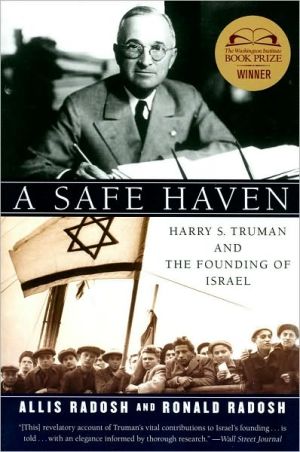

 |

|

The average rating for A Safe Haven: Harry S. Truman and the Founding of Israel based on 2 reviews is 5 stars.
Review # 1 was written on 2011-01-25 00:00:00 Gina Wooten Gina Wooten"Safe Haven: Harry S. Truman and the Founding of Israel", by Allis Radosh and Ronald Radosh -- After World War I, the League of Nations gave Great Britain a mandate over Palestine, one of the Arabian territories liberated from the Turks. By that time, there was already a substantial Jewish presence in Palestine agitating for a National Jewish homeland. In the Balfour Declaration, Britain promised the Jews such a homeland in the territory of Palestine. Years later, Britain issued its so called White Paper, in which it effectively reneged on its promise. After World War II and the Nazi extermination of millions of European Jews, the incentive for Jews to emigrate from Europe to Palestine was great and it was accompanied by world wide sympathy for their plight. However, Britain was dead set on enforcing an embargo on immigration of Jews to Palestine, even though hundreds of thousands of Jewish concentration camp survivors remained in displaced persons' camps in Europe run by the allies under conditions that were only somewhat better than the German concentration camps, sans the killing of the Jews. Britain was getting no help in Palestine and grew weary of the cost in sterling and in adverse public opinion, so decided to throw the entire issue of what to do about Palestine to the newly created United Nations. Should it be split between a Jewish homeland and an Arab state, should it be some sort of a confederation of a Jewish part and an Arab part, should it be an Arab state with a Jewish minority, or should the U.N. effectively extend the mandate with the U.N. in charge, rather than the British? Only a separate state would insure unlimited Jewish immigration and would be satisfactory to the Jews. Only an Arab state throughout Palestine would be acceptable to the Arabs. Britain and the U.S. state department were adamant in not wanting a Jewish homeland anywhere in Arabia. "Safe Haven" tells the blow by blow story of how Truman decided to accept partition of Palestine, approve a Jewish homeland, and immediately recognize the new state once the British left and the Jews declared the state of Israel. Truman's wavering, the state department's efforts to thwart Truman's agreement to accept partition, and the dispute and almost schism between Truman and General George Marshall, whom Truman considered the most important official in his government, are described in great detail in the book. It is absolutely fascinating and reads like a mystery. I could not put it down, even though I knew the ending. |
Review # 2 was written on 2014-12-14 00:00:00 Jay Leray Jay LerayMagnificent. Beautiful. Poignant. Historical. I've read a lot of articles, white papers, and books on the Middle East, but nothing that compares with this tightly woven, thoroughly detailed, and completely absorbing work by Dr. Radosh on the foreign policy and political intrigue surrounding the 1948 founding of the State of Israel. Starting with the Balfour Declaration in 1917, Haven proceeds to weave an intense narrative that is smoothly paced, even as it contains an abundance of primary sources (telegrams, meeting notes, diary entries) balanced again traditional autobiographies and current affairs pieces (mostly from the era). Despite the massive amount of data and source material, Dr. Radosh never allows Haven to feel forced or pedantic. Even a minor history buff knows the outcome of this seeming diplomatic impasse in history, but I found myself totally enveloped in the urgent drama Haven accurately recreates. Highlights include: --First, Safe Haven effectively illustrates the political tension between a post-World War II Britain and the United States government, contrasting their opposing visions for the Middle East. --Second, Haven does an effective, if minimalist job of recreating the mindset of the American landscape (including Truman) in regards to the "Israeli question." Another book could be written on this subject--but as Dr. Radosh notes--it already has been (Israel in the Mind of America, 1983). --Third, Haven does an amazing job recreating the intrigue surrounding UNSCOP and the various maneuverings by U.N member states during the days leading up to the critical vote for independence. --Fourth (and perhaps most intriguing), Haven presents startlingly vivid evidence as to the manipulations and machinations of the U.S. State Department, which effectively functioned as Truman's behind-the-scenes opponent for much of the Israeli-Arab debate (earning his permanent distrust in the process). The crystalline picture that emerges is one of a U.S. government in conflict with itself, resulting in several instances of severe international uncertainty as to where the United States actually stood on the Israeli issue. The dynamics between Truman's Oval Office and Gen. Marshall's State Department are some of Haven's most fascinating moments. --Finally, Haven establishes a nuanced overall picture of a decidedly straight-forward man--President Harry Truman himself. Neither hagiographic nor antagonistic in tone, Haven portraits a human with decided beliefs, swayed and shaped by political circumstances, but ultimately remaining constant to those core principles. Regardless of your current political stance on the Middle East, Safe Haven delivers a strongly historical, well-researched, and entirely enjoyable read. Your base of knowledge will certainly be improved for having taken this journey. |
CAN'T FIND WHAT YOU'RE LOOKING FOR? CLICK HERE!!!